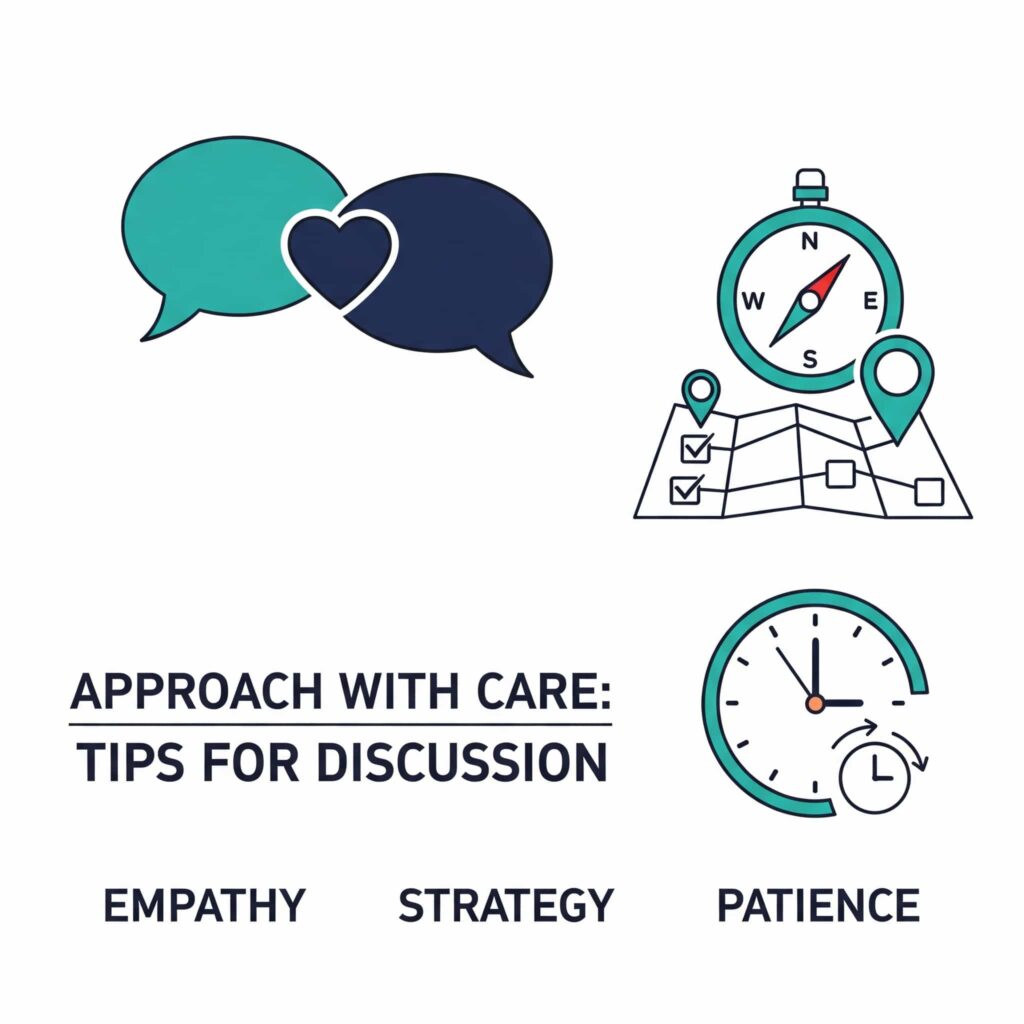-
Talk to Our Care Planner
31 Essential Questions to Ask Aging Parents – Checklist (And How to Have Those Conversations)

The thought alone can send a shiver down your spine: “I need to talk to Mom and Dad about… everything.” Health. Finances. Living arrangements. End-of-life wishes.
These aren’t easy conversations. In fact, for many, they’re among the hardest you’ll ever initiate.
You’re likely feeling a mix of apprehension, love, duty, and maybe even a touch of fear. Fear of upsetting them. Fear of what you might discover.
But… these conversations are non-negotiable.
Procrastination often leads to crisis, stress, and difficult decisions made under duress.
Having these talks now, while your parents are able to participate fully and make their own choices, is the most profound act of love and respect you can offer.
We’ve walked alongside countless Boston families through these exact moments. We understand the delicacy, the emotions, and the immense importance.
This guide provides a comprehensive checklist of essential questions to ask aging parents, but crucially, it also offers strategies on how to have these conversations with empathy, grace, and effectiveness.
Your Essential Questions to Ask Aging Parents: The Comprehensive 31-Point Checklist
This checklist is designed to guide your conversations across key areas. We recommend using it as a reference, not a script.
Take notes and celebrate every piece of information you gather. Remember, this isn’t a one-time interrogation, but a guide for ongoing dialogue.
Download Your FREE “Questions to Ask Aging Parents: 31-Point Checklist” PDF Here!
Section 1: Health & Medical Care Questions

Understanding their current health status and medical wishes is vital for future planning and emergencies.
1. What are your current medical conditions, diagnoses, and any known allergies? If it came down to getting some form of care at home, which of home care simply or home health care(medical) would you consider at the moment?
2. What medications (prescription, over the counter, supplements) are you currently taking, and what are their dosages?
3. Who are your primary care physicians and specialists (e.g., cardiologist, oncologist)? Can we have their contact information?
4. Who is your preferred pharmacy, and do they have your complete medication list?
5. Have you completed an Advance Directive, Living Will, or designated a Healthcare Proxy (Durable Power of Attorney for Healthcare)? Where are these documents stored?
6. What are your wishes regarding life-sustaining treatments (e.g., CPR, feeding tubes, ventilators) if you cannot communicate?
7. Do you have preferences for pain management, palliative care, or hospice care if facing a serious illness?
8. Where are your medical records kept, and what health insurance do you currently have (e.g., Medicare, supplemental plans, private insurance)?
9. Who should be contacted immediately in a medical emergency, besides family?
Section 2: Legal & Financial Preparedness Questions

This section can be sensitive, but it’s critical for protecting your parents’ assets and ensuring their wishes are legally honored.
10. Do you have a Last Will and Testament? Where is it located, and who is named as the executor?
11. Have you designated a Durable Power of Attorney for Finances? Who is authorized to handle financial matters if you become unable?
12. What banks, credit unions, or investment firms do you use? (Not account numbers, just the institutions).
13. Where are important financial documents kept (e.g., deeds, stock certificates, insurance policies, tax returns)?
14. What are your sources of income (e.g., Social Security, pension, investments, retirement accounts)?
15. Do you have long-term care insurance policies? If so, what does it cover, and where are the policy details? Long-term care insurance can sometimes overlap with 24-hour care costs at home, which many families consider in later stages of aging.
16. Do you have life insurance policies? If so, where are they kept, and who are the beneficiaries?
17. Who is your attorney, financial advisor, accountant, or tax preparer? Can we have their contact information?
18. Have you made any pre-arrangements or expressed wishes for your funeral or memorial service? Where are these details kept?
Section 3: Living Arrangements & Daily Life Questions

You need to understand their current comfort and future preferences for living in order to plan appropriate care and maintaining independence.
19. Are you happy and comfortable in your current home? Do you feel safe and secure?
20. Are there any modifications that would make your home safer or more accessible (e.g., grab bars, ramps, stair lifts)? You might also review our tips on shower assistance for elderly people — a common source of home accidents that can be prevented.
21. Are you managing daily tasks like cooking, light housekeeping, bathing, and dressing easily and independently? Would you be open to discussing what a typical daily schedule with home care support might involve?
22. Are you able to manage transportation for groceries, appointments, and errands?
23. What are your plans for staying active and socially connected within the community? Have you considered exploring engaging indoor activities for seniors or perhaps some fun party games for elderly as ways to stay connected?
24. If you needed more daily help, what would be your ideal living situation (e.g., staying at home with support, moving in with family, independent living, assisted living, nursing home)?
We could explore the differences together, like assisted living vs. home care, or even discuss the costs involved, such as how to pay for nursing home care with Social Security.
25. What factors are most important to you when considering any change in living situation (e.g., proximity to family, social activities, privacy, cost)?
26. What are your feelings about receiving in-home care services (like personal care or companionship) if and when needed?
Section 4: Personal Wishes & Legacy Questions

These questions go beyond logistics to touch on emotional and spiritual well-being, respecting their autonomy, values, and history.
27. Are there any personal goals, hobbies, or experiences you still wish to pursue?
28. Are there any specific personal possessions, family heirlooms, or sentimental items you would like to go to particular family members?
29. What values, life lessons, or family stories would you like to share or ensure are passed on to future generations?
30. Do you have any specific spiritual or religious wishes, especially for end-of-life care or services? Would you be open to using hospice care?
31. Are there any unfulfilled wishes or regrets you’d like to discuss or find a way to address?
Download Your FREE “Questions to Ask Aging Parents: 31-Point Checklist” PDF Here!
Why Talking To Aging Parents Matters So Much (And Why It’s So Hard)
Now that you have the questions, let’s acknowledge the reality of why having them feels like scaling a mountain.
- The Power Shift:
For parents, discussing these topics can feel like a painful reminder of aging, a loss of control, or even an interrogation.
They’ve always been the providers, the decision-makers. Now, the roles are subtly shifting, and that can feel threatening to their independence.
- Fear of the Unknown:
Both sides fear what these changes might mean. For parents, it’s losing independence, dignity, or quality of life.
For adult children, it’s facing mortality, increased responsibility, and potentially difficult caregiving scenarios. You might even feel trapped caring for an elderly parent.
- The “We Don’t Talk About That” Barrier:
Many families have unspoken rules, especially around highly personal topics like money, health, and death.
Breaking these lifelong patterns is inherently uncomfortable and can bring up old family dynamics.
- Emotional Triggers:
Past resentments, unaddressed issues, or differing expectations can easily surface, derailing productive conversation.
The payoff for pushing through this discomfort is immense peace of mind, crystal-clear clarity for future decisions, reduced stress during unexpected crises, and most importantly, the profound satisfaction of honoring your parents’ wishes while they are still able to express them clearly and participate in their own future.
How to Approach These Conversations: Empathy, Strategy, and Patience
This isn’t a single sit-down, spreadsheet-and-checklist interrogation. Think of it as an ongoing dialogue, a series of open-ended, gentle conversations that build trust over time.

1. Choose the Right Time and Place:
Opt for a comfortable, private, and familiar environment – perhaps during a casual visit, over a cup of tea, or during a shared meal. Avoid holidays or stressful family gatherings, which are often rushed or emotionally charged.
Ensure you have ample, uninterrupted time. Rushing will only create anxiety and resentment. Turn off distractions.
Are your parents rested, relaxed, and open? Avoid initiating these talks when they are tired, stressed, or in pain.
2. Start Small, Be Gentle, and Frame with Love:
- Ease In: Don’t ambush them with the entire 31-point checklist. Begin with less sensitive topics (e.g., daily comfort in their home) and gauge their receptiveness.
- Frame with Love: Always start by expressing your genuine care and concern. “Mom, Dad, I love you deeply, and I want to make sure we’re prepared for anything life throws our way, so you can continue to live exactly as you wish, with dignity and security.”
- “What If” Scenarios: Use gentle, hypothetical “what if” questions. “What if you needed a little extra help with meals down the road?” or “What if something unexpected happened to one of you, and we needed to know your wishes?”
- Share Your Own Experience: Sometimes, sharing your own preparations (“I just updated my own will and it got me thinking…”) can open the door by normalizing the conversation.
3. Listen More Than You Talk:
Pay attention not just to their words, but to their emotions. Acknowledge their feelings immediately: “I can see this is difficult to talk about, and I appreciate you sharing.”
Avoid simple yes/no questions. Encourage them to share their thoughts, feelings, and fears. “What are your greatest concerns about the future?” is far more effective than “Are you worried?”
Emphasize repeatedly that these are their decisions, and your role is to support them in making choices that truly align with their wishes, not yours.
4. Involve Others (If Appropriate):
Coordinate with siblings beforehand. Present a united front and decide who will lead which parts of the conversation. One sibling might be better at discussing certain topics (e.g., finances) than others.
Sometimes, parents are more comfortable discussing finances or legal matters with their own long-time attorney, financial advisor, or even a trusted spiritual leader. You can offer to facilitate a meeting.
For particularly difficult or complex conversations, consider involving a geriatric care manager (also known as an aging life care professional). They are experts at facilitating these discussions gently, objectively, and can provide unbiased advice and resources.
5. Be Patient. Be Persistent. Be Prepared for Multiple Conversations:
This will not be a one-time event. You’ll likely need a series of discussions over weeks, months, or even years. Don’t push too hard if they resist or become emotional.
Take a break and gently revisit topics when the time feels right. Celebrate small victories – every piece of information gained is valuable.
If the conversation becomes emotional, some families use funny quotes about age or light storytelling prompts to ease into the moment.
After the Conversation: What Happens Next?
Having these crucial conversations is a huge accomplishment. But gathering the information is just the first, albeit monumental, step. Now, it’s about organization and action.
1. Document Everything Thoroughly: Keep a detailed, organized record of your discussions, any decisions made, and the exact location of all important documents. Consider creating a dedicated physical binder and/or a secure, password-protected digital folder. Make sure trusted family members know where this “go-to” binder is.
2. Share Information (Appropriately and with Permission): With your parents’ explicit permission, share relevant information with siblings or other key family members who might need to be involved in future care or decisions. Clarity prevents future conflict.
3. Review Regularly: These are not one-and-done conversations. Life changes, health changes, and wishes can evolve over time. Plan to revisit these topics annually, or as significant life circumstances dictate.
4. Seek Professional Guidance (You Don’t Have to Do This Alone):
- Elder Law Attorneys: Essential for ensuring all legal documents (Wills, Powers of Attorney, Advance Directives) are properly prepared, executed, and legally binding. They can also advise on estate planning.
- Financial Advisors: Can help with managing assets, retirement planning, and understanding long-term care costs.
- Geriatric Care Managers: These professionals can be your compass, assessing needs, creating comprehensive care plans, coordinating services (medical, legal, financial), and helping families navigate complex decisions, including transitions to different living situations. The Aging Life Care Association can help you find a certified professional in the Boston area.
- Home Care Agencies: For direct support with daily living, in-home care services from reputable agencies like Global One Home Care can be a lifeline. We provide professional caregivers for a few hours a day, overnight, or even for live-in care, ensuring your parents’ comfort and safety while providing much-needed caregiver relief.
If you’re looking into professional care options, understanding the differences between a PCA vs. HHA or a caregiver vs. CNA can be very helpful.
You’ve Got This. Take the First Step.
Approaching these vital conversations with your aging parents requires immense courage and love. It’s a profound testament to your dedication to their well-being and a commitment to honoring their autonomy.
By taking the proactive step to ask these essential questions, you’re not just planning for the future; you’re strengthening your family bonds and ensuring your parents’ dignity and wishes are respected every step of the way.
Remember, every great journey begins with a single step. For you, that step might be downloading this checklist, or simply deciding to initiate that first gentle conversation. We’re here to support you in Boston, whenever you’re ready to navigate this important chapter together
Dr. Ella Njike is the CEO and founder of Global One Home Care Boston, a Boston-based agency providing compassionate in-home support for seniors and individuals with disabilities. With a Doctorate and extensive experience working in the healthcare industry, Dr Ella brings a unique understanding to the challenges families face. He established Global One Home Care to ensure that care extends beyond daily tasks, focusing on building genuine connections and respecting each individual's journey. Dr. Njike is deeply committed to creating an environment where clients feel truly valued and at home.
Contact us
We aim to be an active partner in your care, not to take over. You are the CEO of your care, and we support you in managing it effectively.
Here are some features of our Global One Home Care
- 24/7 access to care
- Customized care plans
- Supervisory visits
- Caregiver introductions
- Nutritional planning
- Respite support
- Companionship
- Mobility assistance
- Durable Medical Equipment recommendations
- Errands and Shopping
- Fall Prevention
- ADLs

